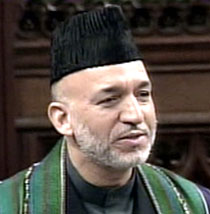Afghan government accuses UN envoy of acting beyond his authority
 Kabul - Afghanistan's Foreign Ministry said Saturday that top United Nations envoy in the country was acting beyond his authority by instructing the new government of President Hamid Karzai to exclude warlords and bring reforms.
Kabul - Afghanistan's Foreign Ministry said Saturday that top United Nations envoy in the country was acting beyond his authority by instructing the new government of President Hamid Karzai to exclude warlords and bring reforms.
"Kai Eide delivered comments which exceeded international norms and his authority as a representative of an impartial international organization," the foreign ministry said, referring to the Norwegian diplomat and the special representative of the UN secretary general.
On Thursday, Eide said that the international community did not want to see warlords playing roles in Karzai's new government, and called on the incumbent to bring "significant reform."
Eide said that Karzai must compose his new cabinet with competent, reform-oriented personalities that can implement a reform agenda, adding that the international community would not continue with its commitment with his government unless there were clear steps for reform.
Western leaders, including US President Barack Obama, and British Prime Minister, Gordon Brown have also called on Karzai to reform his cabinet and fight the endemic administrative corruption that had defamed his government before the international community and disillusioned the Afghan people in the past eight years.
While Obama has called for a quick action by Karzai, Brown said Friday that Karzai would risk the withdrawal of international support if his government should fail to improve security and root out corruption.
The UN Security Council also joined the chorus on Friday by calling on Karzai government to fight corruption and the drug trade.
"I am not prepared to put the lives of British men and women in harm's way for a government that does not stand up against corruption," Brown said in a speech in London.
In a strong indication that the new Karzai administration would not readily bow to international community's pressures in future, the foreign ministry statement accused some people in Western countries of meddling in Afghanistan's internal affairs.
"Over the last few days some political and diplomatic circles and propaganda agencies of certain foreign countries have intervened in Afghanistan's internal affairs by issuing instructions concerning the composition of Afghan government organs and political policy of Afghanistan," the statement said.
"Such instructions have violated respect for Afghanistan's national sovereignty," it added.
Karzai was declared the winner of August presidential election after a planned runoff that was to have been held this weekend was scrapped by Karzai challenger Abdullah Abdullah, who said he dropped out, because the second round of the voting would also be subject to rigging. A third of Karzai's vote was discounted by a UN-backed body because of fraud in the first round of the balloting.
Under the country's laws, the president has to inaugurate his new government within 30 days of the announcement of his victory, but officials doubt such deadline would be likely, because Karzai needs more time to please his Western backers by bringing competent individuals in his new team and at same time make some concessions to those who supported him during the election.
In order to guarantee his re-election, Karzai picked Marshal Mohammad Qasim Fahim, the most powerful warlord, as his first vice president, and accepted support from General Abdul Rashid Dostum, another powerful warlord, during the election. Both Fahim and Dostum are accused of war crimes by human rights organization.
Eide, who had criticized Karzai's decision to include Fahim and Dostum in his campaign team, said on Thursday that Afghanistan must put an end to culture of impunity.
"We cannot afford any longer a situation in which warlords play their own games; we have to have a political landscape that draws the country in the same direction which is in a direction of significant reform," Eide said.
The Western officials have also asked Karzai to include some members of Abdullah's camp in the new administration and to create a government of "national unity."
Karzai has said that he was willing to include members of his opposition group in his new government, but has not been more specific.(dpa)